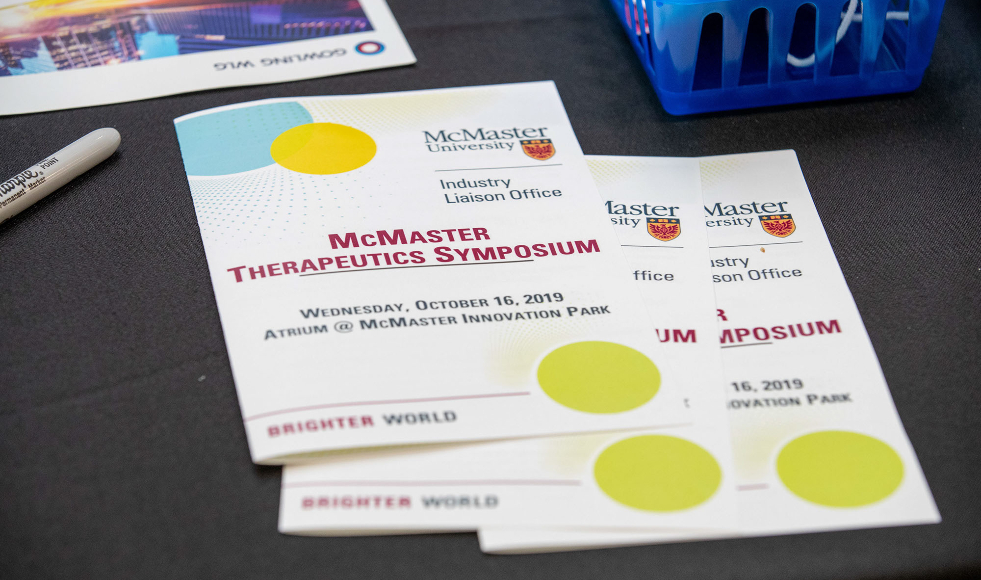McMaster connects academics, entrepreneurs and industry at Therapeutics Symposium

BY Sara Laux
October 23, 2019
Academic researchers, trainees, investors and entrepreneurs gathered at the Atrium in McMaster Innovation Park last week to learn, connect and celebrate recent successes that McMaster researchers have had with commercializing their work.
“We wanted to highlight the success of several McMaster therapeutic startups, some of whom have secured significant funding,” explained Jae-Ho Yoo, a business development manager in life sciences with McMaster’s Industry Liaison Office (MILO). “It can be hard for investors to see what’s going on at Mac, so we wanted an opportunity to show that we punch above our weight and also acknowledge the support that’s been provided so far.”
The day-long event featured sessions on partnering and investment, as well as presentations from the business leaders or scientific founders of five McMaster therapeutic startups:
- Fusion Pharmaceuticals (founded by McMaster chemistry professor John Valliant) recently secured $105 million in private financing (following an earlier investment of $46 million) to further develop cancer therapies using alpha medical isotopes, which, combined with targeting molecules, are able to deliver a precise dose of radiation to cancer cells.
- Turnstone Biologics (co-founded by Brian Lichty, an associate professor in McMaster’s Department of Pathology and Molecular Medicine) uses engineered viruses – specifically, the Maraba virus, which originated in Brazil – as platforms to kill tumours and encourage an immune response to prevent recurrence. The company has raised $50 million in venture capital funding, and more than $100 million in non-dilutive funding.
- Adapsyn Bioscience (founded by Nathan Magarvey, an associate professor in McMaster’s departments of Biochemistry and Biomedical Sciences, and Chemistry and Chemical Biology) uses artificial intelligence and proprietary algorithms to discover new drugs from existing human and environmental microbes.
- Triumvira Immunologics (co-founded by Jonathan Bramson, a professor of pathology and molecular medicine) develops new T-cell therapies that are safer and more effective than current cancer treatments.
- Empirica Therapeutics (founded by professor of surgery and neurosurgeon Sheila Singh), the “youngest and newest startup” in the group, according to Singh, is working on developing immunotherapies for aggressive and treatment-resistant forms of cancer, including glioblastoma (the type of brain cancer that killed Tragically Hip lead singer Gord Downie) and brain metastasis.
“It’s inspiring to see what Mac has been able to build,” Singh said during her presentation. “As a scientist, we want to reach an end. To get this research across the finish line, we need to leverage the power of the public and private sectors.”
And the way to do that, says Yoo, is to bring everyone together in the same place to hear researchers’ success stories and discuss new opportunities.
“We want people outside of Hamilton to know how strong we are in this area,” he says. “Once we do that, we can further expand the achievements of our researchers.”


